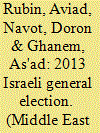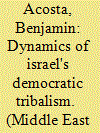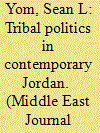| Srl | Item |
| 1 |
ID:
129894


|
|
|
|
|
| Publication |
2014.
|
| Summary/Abstract |
Despite resulting in a different party configuration, the results of the 2013 Israeli general election support a similar agenda to the one set by the previous government. A year following its establishment, all indicators suggest that the current government continues to deepen neoliberal policies. Nevertheless, this election reflects two important trends: first, an ever growing discontent in Israeli public that probably would not find a solution during the tenure of the incoming government; second, lack of interest in the Israeli-Palestinian conflict that might generate negative long-term consequences.
|
|
|
|
|
|
|
|
|
|
|
|
|
|
|
|
| 2 |
ID:
129898


|
|
|
|
|
| Publication |
2014.
|
| Summary/Abstract |
This article evaluates Israeli national identity and its core founding tenets of Zionism, democracy, and Judaism. For decades, demographic changes and associated cultural and ideological fluctuations have gradually pushed Israel into a national identity conflict, as multiple ethnic and sectarian identity groups have come to promote competing interpretations of the state's purpose, political nature, and connection to territory. Continued demographic shifts, situated amid the sociopolitical dynamics of what this article will define as Israel's "democratic tribalism," will further test the compatibility of the constituent parts of Israeli national identity: the respective roles of Zionist ideology, democratic institutions, and the territory of the historic Jewish homeland.
|
|
|
|
|
|
|
|
|
|
|
|
|
|
|
|
| 3 |
ID:
129884


|
|
|
|
|
| Publication |
2014.
|
| Summary/Abstract |
Many of the transactional features that mark Pakistan's relations with Saudi Arabia are familiarly strategic and economic. But there also exists a qualitative dimension to what draws together these two Islamic states. This article points to how each country has been able to compensate for the other's resource deficits even when national interests diverge their unique spiritual bonding ensures a strong measures of continuity in their relationship. These ties are nonetheless regularly tested by the difficult choice Saudi Arabia's Iran-centric policies can create for Pakistan.
|
|
|
|
|
|
|
|
|
|
|
|
|
|
|
|
| 4 |
ID:
129882


|
|
|
|
|
| Publication |
2014.
|
| Summary/Abstract |
After the 1947 partition of India, the government of Afghanistan found an opportunity to reclaim the lands lost to British India as a result of the Durand Line agreement in 1983. These lands, known as Pashtinistan, were annexed to Pakistan. The issue of Pashtinistan's fate become the backbone of Afghanistan's foreign and domestic policies. This article explores the reasons for the Pashtunistan issue's significance to Afghanistan's royal family and how a policy of advancing Pashtun nationalism was conducted by the government, and what the issue meant for newly established political parties.
|
|
|
|
|
|
|
|
|
|
|
|
|
|
|
|
| 5 |
ID:
129892


|
|
|
|
|
| Publication |
2014.
|
| Summary/Abstract |
During 2011/12, East Bank tribal youths in Jordan mobilized a new wave of political opposition through the Hirak movement. Reflecting generational change in their communities, as well as the historical erosion of tribal-state relations, these protest groups demanded sweeping democratic reforms from the monarchy. They also utilized language and methods more radical than the established legal opposition. This changing dynamic of tribal politics holds enormous implications for politics and stability within the Hashemite kingdom.
|
|
|
|
|
|
|
|
|
|
|
|
|
|
|
|